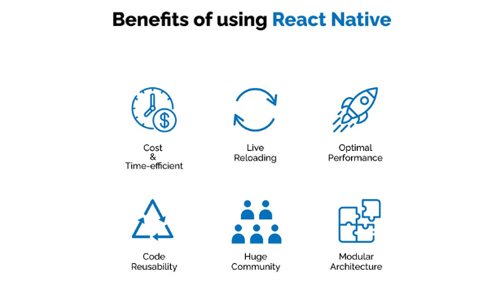Advantages of Selecting React Native?

New apps are constantly coming out on the smartphone app market, and some old ones disappear from our memory and phones. With each new horizon we conquer, users' expectations rise, making it difficult for developers to keep building apps that please them. Thus, developers are finding innovative ways to create products that stand out from the crowd to outdo their previous efforts.
Apps in the market can be classified as either native or hybrid. Native apps are developed separately for Android, iOS, and Windows. On the other hand, hybrid apps are designed only once and work across multiple platforms. There are pros and cons to both types of apps- native apps are more robust, more secure, and have a better UI/UX, but they take a long time and a lot of money to develop. The performance and quality of hybrid apps are poor, but they are cheaper and quicker to make.
There is no way to choose between quality and cost; you must compromise on one. It must be possible to bypass this all together. There is, and it is called React Native.
JavaScript is all you need to build a mobile app with React Native. You can also create apps with beautiful UI using React- A JavaScript library for building UI. React Native's role and how it differs from other hybrid app development platforms can easily be misunderstood.
Using React Native, you can build real mobile apps that are indistinguishable from those written in Objective-C or Java. Using React and JavaScript, React Native encapsulates the same building blocks as Android and iOS apps.
We can now move on to some of the critical advantages of React Native:

- Mobile apps can be created using website technology using React Native. Using React Native, a web developer can quickly develop a mobile app.
- Since React Native uses both JavaScript components built on iOS and Android features, developers can build cross-platform apps that look and feel entirely native. Developers don't have to create the same app for multiple platforms, saving them time and money. A React Native app is also easier to maintain since only one codebase exists.
- A developer can develop an app with React Native using JSX without learning Objective-C or Java.
- Native apps for Android and iOS are compiled in JavaScript using React Native. It simplifies handling the code base, and adding new features is also simplified, even while the app runs.
- React Native is the perfect choice for clients with tight budgets and time constraints. They save a lot of time and money by not having to develop a single app for multiple platforms. As a result, they are not compromising on quality by using React Native. Using JavaScript, an app can be compiled to create a Native environment for different platforms. Hybrid apps lack beautiful UI/UX and safety features provided by React Native.
- Mobile apps can be created using website technology using React Native. Using React Native, a web developer can quickly develop a mobile app.
- Since React Native uses both JavaScript components built on iOS and Android features, developers can build cross-platform apps that look and feel entirely native. Developers don't have to create the same app for multiple platforms, saving them time and money. A React Native app is also easier to maintain since only one codebase exists.
- A developer can develop an app with React Native using JSX without learning Objective-C or Java.
